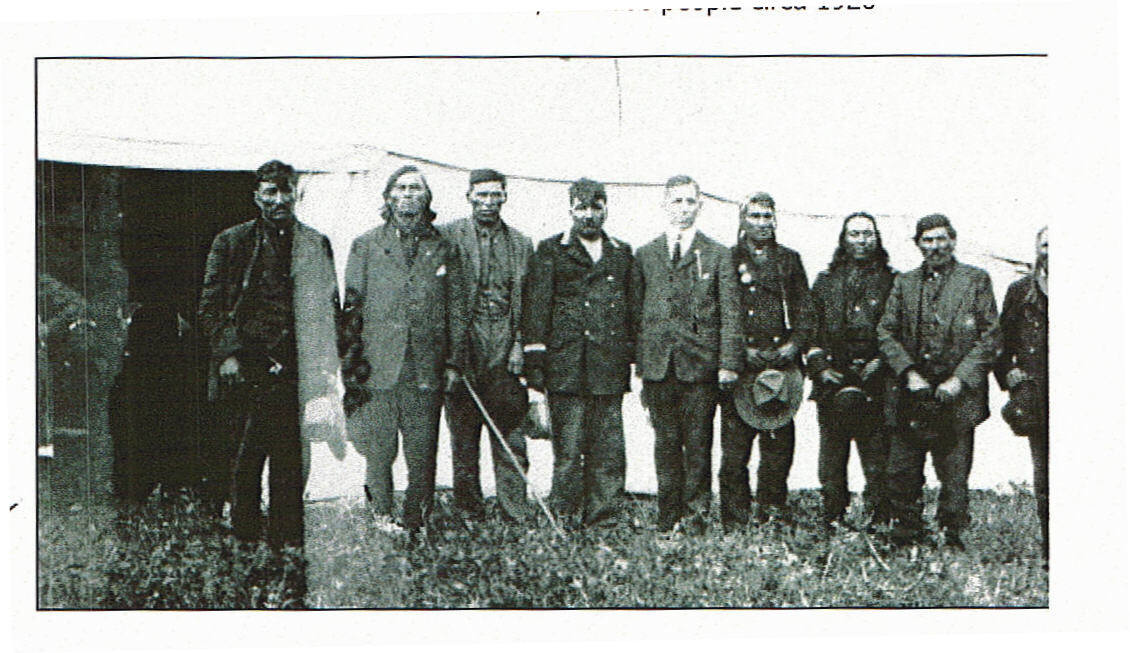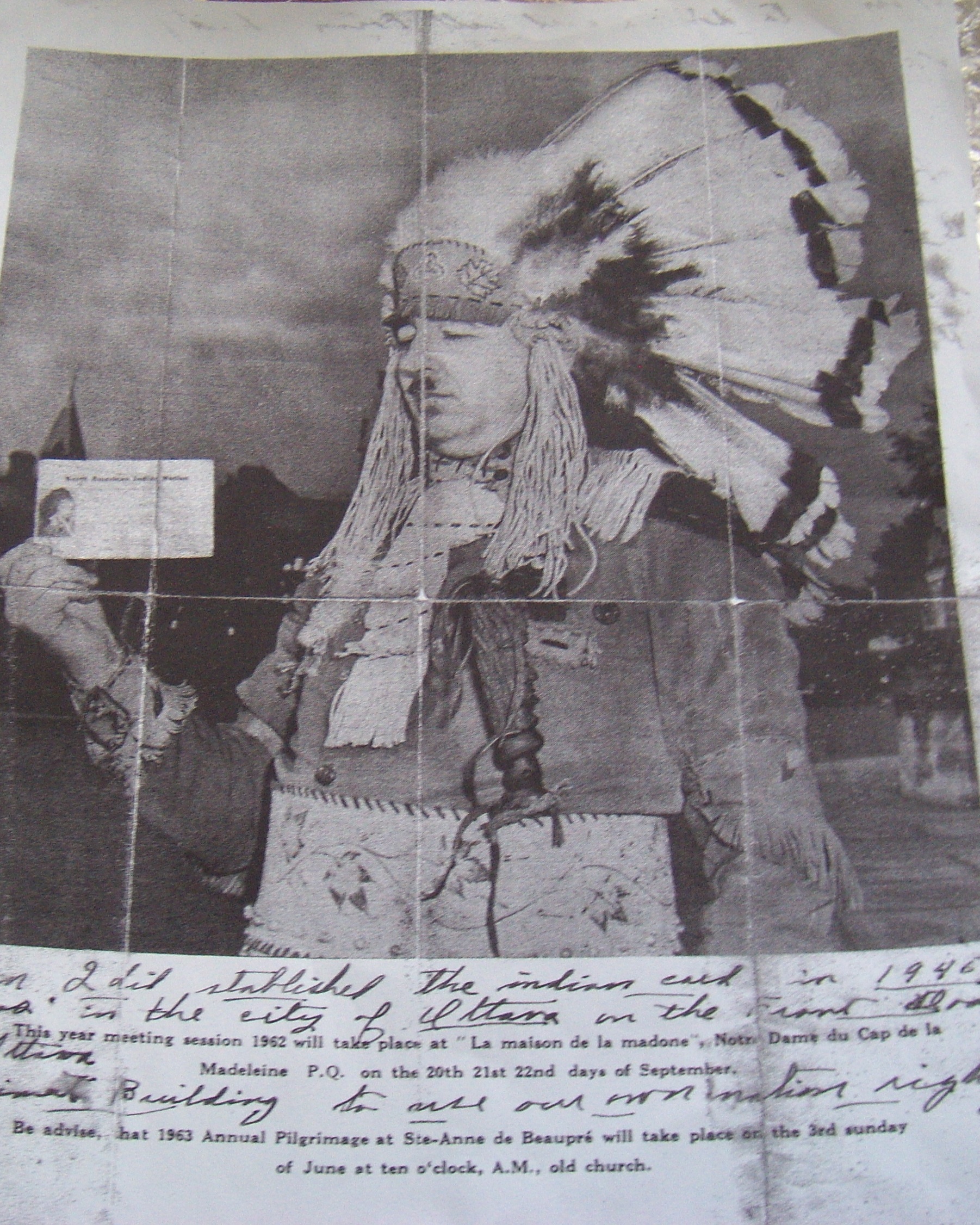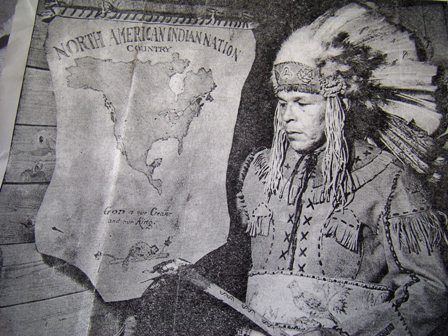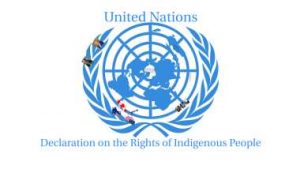Update as of 2023
Updated as of 2022
MAKING HISTORY 2008
NORTH BAY, ONTARIO
DECEMBER 28TH, 2007
INTERNATIONAL PARLIAMENT FOR SAFETY AND PEACE
Letter from The Lord President + Msgr Sen. Viktor Busà
1944 CONSTITUTION
OTTAWA, ONTARIO
JUNE, 8, 1944
THE LEGAL CONSTITUTION OF THE INDIAN NATIONS OF NORTH AMERICA
The first step taken at the convention of the delegates of the Indian Chiefs held at Ottawa, on June 7, 1944, in the Y.M.C.A. building, was to elect an acting President; therefore, James Fox was chosen as such. The acting President asked the leader of the convention to take the floor and explain the rules and regulations which are to constitute the fundamental basis of the legal Constitution.
The leader of the convention, Jules Sioui, submitted the following explanations:
- The acting President shall, at the opening of every great meeting, call upon the Supreme Chief of the Nations, enjoining him to say a prayer to the Great Spirit of above, petitioning His aid in favor of the Indian Nations of North America.
- The Authorities of the League of the Indian Nations of North America shall take all the necessary measures on order to make sure that every Indian shall back the Royal Proclamation of 1763, which was signed in favor of the Indian Nations and for its best interest.
- The Authorities of the League of Indian Nations of North America shall be guarantors of the integral respect of the legal rights. They will inform the members of the Nations of their full liberties and their independence all over America.
- The Authorities of the League of Indian Nations of North America shall be guarantors of the integral respect of the legal rights. To make it be known that the Indian Nation is a Nation with the right to exist on the dame footing as any other nation all over the world.
- The Authorities of the League of Indian Nations of North America shall be guarantors of the integral respect of the legal rights. They shall endeavor to have all the treaties that were passed, respected and recognized, in order that the liberty and independence of the Indian Nations of North America be guaranteed.
- The Authorities of the League of Indian Nations of North America shall be guarantors of the integral respect of the legal rights. They shall make the members of the Nation understand that they are obliged to obtain an identification card so that they will be recognized as Indian belonging to a given NATION, consequently having the right to all the protection and privileges that accrue to those possessing the rights of the legal constitution.
- The Authorities of the League of Indian Nations of North America shall be guarantors of the integral respect of the legal rights. They shall have the power to negotiate with His Majesty’s government, at Ottawa, in regards to the natural resources in so far as the interests of the Indian Nations are concerned.
- The Authorities of the League of Indian Nations of North America shall be guarantors of the integral respect of the legal rights. They shall never declare war against any other nation nor participate in any war, no matter who is at war.
- The Authorities of the League of Indian Nations of North America shall be guarantors of the integral respect of the legal rights. The shall make it known that no white man has the right to live on Indian land, unless he has first obtained a permit issued by the Authorities of the League, which means to say that each nation must have an official plan to the limits of land.
- The Authorities of the League of Indian Nations of North America shall be guarantors of the integral respect of the legal rights. they shall see to it that the Indians be given the privileges of hunting, fishing and trapping there where game is to be found (i.e. fur bearing animals) without expecting any territory, and with the distinct understanding that neither the provincial nor federal authorities shall have the right to stop them nor prosecute them, as long as the Indian avails himself of his rights for his personal needs or those of the Nation.
- The Authorities of the League of Indian Nations of North America shall be guarantors of the integral respect of the legal rights. They shall retain the right to have school Masters who can teach the national language, according to the nation, and the study of the Nation’s history shall be obligatory, which will permit the children of the future generations to study and better know their race, the people and their country, and be in a better spirit to obey the authorities of the Nation.
- The Authorities of the League of Indian Nations of North America shall be guarantors of the integral respect of the legal rights. They shall explain to the entire nation of June 5th of each year is to be considered a national feast all over North America, that is to say by each nation, and this will enable each one to have a holiday; consequently those who work on salary shall loose no pay. This will permit future generations to rejoice in being members of the Indian Nations and proud of their nationality and ideals.
Signed Supreme Chief: Jim Horton
Assistant: John Tootoosis
Secretary of the League: Jules Sioui
Click here for a more precise explanation to further understand each article of the constitution; each is in the same order and numbered as such
LES AUTOCHTONES : HISTORIQUE DES LOIS DISCRIMINATOIRES À LEUR ENDROIT
Treaty rights can’t be sold, or traded, the indigenous people have hereditary right to all lands of pre occupation:.
Canadian Charter of Rights: Sect 35,
http://www.justice.gc.ca
United Nation, Bill C-15: United Nations Declaration On The Rights Of Indigenous Peoples Act justice.gc.ca
Les droits ancestraux et le titre aborigène
Granted to Indians, Inuit’s, Métis persons and those naturalized to live under the tutelage of sovereign Indian nations and governments.
- The right to explore whole of North America territory as hunter, fisherman or trapper; to camp where it is convenient without causing any damage to the land or occupants.
- To be exempt from personal income or corporate or government taxes enforced by the federal, provincial, state or municipal governments established.
- To be exempt of military service or draft for compulsory service in any war or military or police action waged by any Commonwealth or North American government.
- To purchase and use a railway ticket or other government owned transport at half price the rate allowed; and to pass all borders and tolls (free) between and within Canada and/or the United States.
- To receive health, medical and education services to the extent of need and/talent, services to be provided and/or fully paid by respective governments.
Virtual Law Office: Royal Proclamation, 1763
Purpose
Whereas We have taken into Our Royal Consideration the extensive and valuable Acquisitions in America, secured to our Crown by the late Definitive Treaty of Peace, concluded at Paris the 10th Day of February last; and being desirous that all Our loving Subjects, as well of our Kingdom as of our Colonies in America, may avail themselves with all convenient Speed, of the great Benefits and Advantages which must accrue therefrom to their Commerce, Manufactures, and Navigation, We have thought fit, with the Advice of our Privy Council. to issue this our Royal Proclamation, hereby to publish and declare to all our loving Subjects, that we have, with the Advice of our Said Privy Council, granted our Letters Patent, under our Great Seal of Great Britain, to erect, within the Countries and Islands ceded and confirmed to Us by the said Treaty, Four distinct and separate Governments, styled and called by the names of Quebec, East Florida, West Florida and Grenada, and limited and bounded as follows:
The first meeting of the League of Indian Nations held in western Canada, hosted by the Keeseekoowenin/Okanase people circa 1920.



JULES SIOUX PERMITION LETTER TO FLY LINNA FLAG

BERNARD COMMANDA
The first meeting to the League of Indian Nations in western Canada was held on the Keeseekoowenin Indian Reserve, circa 1920. The League of Indian Nations- modeled after the League of Nations, the precursor to the United Nations – was organized in eastern Canada by Native veterans that returned from World War I. The Royal Canadian Mounted Police (RCMP) attempted numerous times to disrupt the organization because the Canadian government had laws in place that made it a crime for Native people to organize politics and conduct political activities. According to local elders, the RCMP came to disrupt the meeting, but arrived the day after the meeting concluded and all the delegates had already left.
The League of Indian Nations of North America
The second session of the North American Indian Nation Government was on the 15, 16, and 17 of September 1947, at the Wolverine Hotel in the City of Detroit Michigan, USA.
Some of the names listed in it are:
Chief Bernard Commanda of the Nipissing Band, Nipissing Ontario
Chief John Chabot of the Maniwaki Band (now Kitigan Zibi?), Quebec
Jules Sioui of the Lorette Band, Quebec
Chief Silver Star (E. Matteson) of the Pontiac Branch Band, Sault Ste Marie, Sault Michigan, USA.
It’s Headquarters for 1947-48 were in Loretteville Quebec.
Supplemental Reading
White Man’s Law
Book Description
In the nineteenth century many Canadians took pride in their country’s policy of liberal treatment of Indians. In this thorough reinvestigation of Canadian legal history, Sidney L. Harring sets the record straight, showing how Canada has consistently denied Aboriginal peoples even the most basic civil rights.
Drawing on scores of nineteenth-century legal cases, Harring reveals that colonial and early Canadian judges were largely ignorant of British policy concerning Indians and their lands. He also provides an account of the remarkable tenacity of First Nations in continuing their own legal traditions despite obstruction by the settler society that came to dominate them.
The recognition of ‘pre-existing Aboriginal rights’ in the Constitutional Act of 1982 has shown that Aboriginal legal traditions have a definite place in contemporary Canadian law. This study clearly demonstrates that Canadian Native legal culture requires further study by scholars and more serious attention by courts in rendering decisions.
About the Author
SIDNEY L. HARRING is Professor of Law at CUNY Law School, Queen’s College, City University of New York. He is the author of Crow Dog’s Case: American Indian Sovereignty, Tribal Law, and United States Law in the Nineteenth Century.
Indian Government and Treaties
Visibly satisfied, Prime Minister Pierre Trudeau observes Queen Elizabeth II sign the 1982 Constitution Law, In Ottawa.
Indian Government and the Treaties
(A final option for specific protection of treaties under the constitution may be the last international forum. The following is a brief summary of pertinent facts.)
Indian people on this Continent have always had Indian Government; we have used it to occupy this land and to assert our inherent Sovereignty, which has its roots in our people and their culture. All political powers affecting us, our land and resources must come from that Sovereignty.
These Governments exercised their full authority over their territories prior to the coming of the Europeans to this Continent. Our forefathers agreed to join the Confederation subject to certain rights, lands and resources being reserved to our people in perpetuity in recognition of our status as the original rights that came into being when Canada was created.
Aboriginal rights and Indian self government are of such a fundamental character to the well being of a people that no subsequent relinquishment of those rights without the people’s consent has any legal effect. They take precedence over and above that kind of legal claim. Indian people have never consented to the relinquishment of their status as Indians or of their special rights to Indian Government.
Some of our people have loosely structured Governments and others had hereditary systems in which local or band leaders exercised most political powers. Most Indian Governments were democratic and power rested in the people and this power was distributed among several individuals or institutions. For economic and military reasons it was sometime necessaty to delegate this power to a higher governing council, composed of a head chief and a number of band chiefs. Among the Cree and Saulteaux tribes for example, Band Governemtns were composed of family unitsand their headmen, Societies and their headmen, headmen councils, elder’s councils, the peacemaker, and, the chief who was selected by the elders and headman councils.
For the rest of the article please click on the links below.
